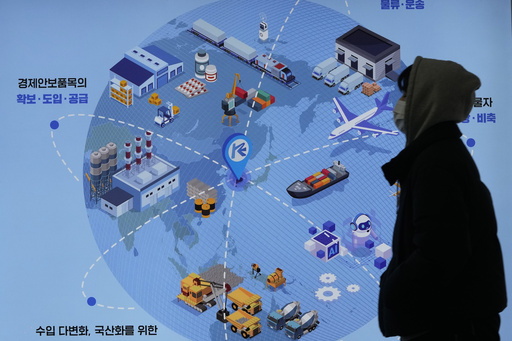
SEOUL, South Korea — South Korea’s leading economic research institute has revised its growth forecast for the nation’s economy for the second time in just four months, highlighting worries over the escalating tariffs initiated by U.S. President Donald Trump.
The Korea Development Institute (KDI) now estimates that South Korea’s economy will expand by only 1.6% in 2025, a reduction of 0.4 percentage points from its earlier prediction made in November.
Economist Kim Jiyeon from KDI pointed to the “decline in the trade environment” that has followed Trump’s assumption of office as a significant contributor to this downturn. The country is also facing instability due to the impeachment and subsequent criminal charges against President Yoon Suk Yeol, who had recently declared a temporary martial law.
Domestic consumption is sluggish, influenced by decreasing consumer expenditure and a deteriorating job market. Jung Kyuchul, who is in charge of macroeconomic analysis at KDI, noted that export growth has slowed, with nearly all major industries, apart from semiconductors, struggling to gain traction. He also indicated that the KDI might have to lower its growth projections further if the trade actions from the Trump administration escalate or if the political instability in South Korea continues.
“In November, we anticipated that Trump’s tariff strategy would unfold gradually without immediate drastic changes this year, but we have already observed significant tariff hikes targeting nations like China,” Jung explained during a press briefing. “We had hoped for a gradual resolution of uncertainties post-Trump’s inauguration, but instead, we’ve found that uncertainties have increased.”
Recently, Trump has announced intentions to implement 25% tariffs on all imported steel and aluminum, following his decision to levy 10% duties on all Chinese goods last month, demonstrating a vigorous effort to alter global trade dynamics.
Jung commented that the impact of these metal tariffs on South Korea’s economy is expected to be minimal, as these items represent less than 1% of the country’s exports to the U.S. However, Trump has also hinted at the possibility of imposing tariffs on key sectors such as automotive, semiconductors, and pharmaceuticals.
“The potential repercussions could be significant, particularly for the semiconductor sector, given its substantial contribution to our exports,” Jung added.
Choi Sang-mok, acting leader and finance minister, stated that Seoul intends to enter negotiations with the Trump administration ahead of the March 12 enforcement date for the tariffs on steel and aluminum, committing to provide “necessary support” to any companies adversely affected by these policies.
“We will keep an eye on nations experiencing similar challenges, like Japan and members of the European Union, and will collaborate on response strategies,” Choi affirmed during a gathering with trade and foreign policy officials. Responding to the new tariffs, the EU has also pledged to implement robust countermeasures.
According to figures from the Korea International Trade Association, South Korea exported approximately $4.8 billion of steel to the U.S. between January and November of the previous year, which accounted for 14% of its total steel exports globally during that time frame.
The significant shifts in U.S. trade policy under the Trump administration are occurring during a precarious period for South Korea, which is dealing with its own political uncertainties. Recent developments regarding President Yoon’s legal predicament might weaken the nation’s ability to effectively navigate changes in U.S. trade policy, analysts suggest.

